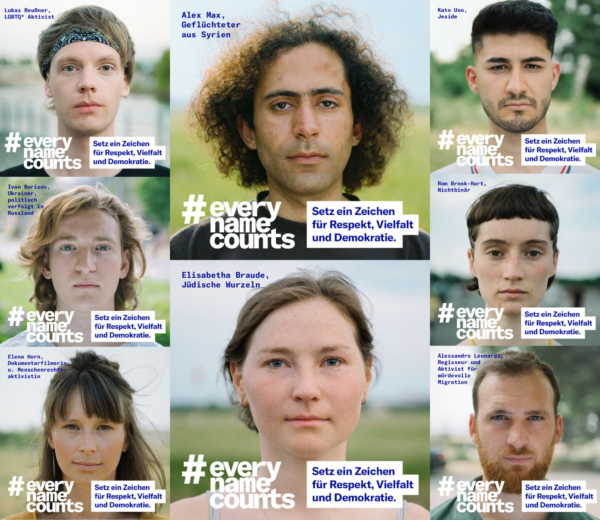Workplace World Heritage: Standing Up for Respect, Diversity and Democracy
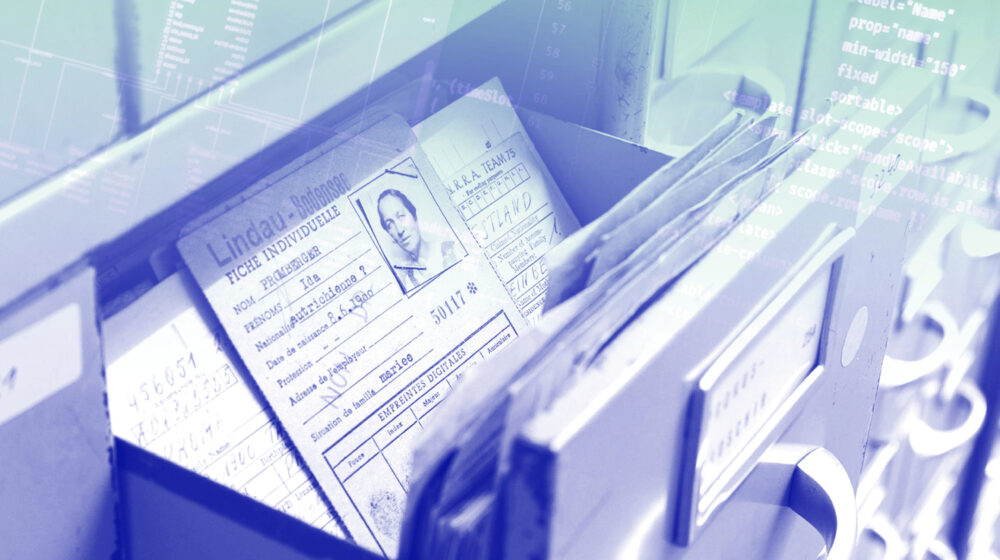
The Arolsen Archives hold the single largest collection of documents on the victims of Nazi persecution. The archive is listed on the UNESCO Memory of the World Register. It is a huge responsibility to safeguard the truth and keep memory alive. This gives today’s society the chance to learn why the idea of a peaceful and strong Europe came about and where exclusion and persecution can lead.
Based on this understanding, we pursue our ambitious goals: We want to motivate people today to stand up for respect, diversity and democracy – because the reasons for persecution are not a thing of the past.
How we work
Real archive and virtual work
The Arolsen Archives currently employ more than 200 people who work at the interface between past and present. We safely store our documents in Bad Arolsen (Germany), but thanks to our digital workflows and flexible conditions, you can work from wherever you live. Your dedication and passion are more important to us than your location. We do get together regularly, of course, because it’s fun and important to our creative processes. You should therefore be willing to meet with us in Bad Arolsen, at our small office in Berlin or elsewhere. Otherwise you are free to work where you want, as long as you are mainly based in Germany.
Diversity for the future
We are an international organization that was founded over 75 years ago by the Allies after the liberation of Nazi Germany. On account of our history, our main working language is German, but we welcome new employees from a variety of backgrounds. Embracing diversity is crucial to staying relevant to younger generations. So don’t be shy: apply even if you have limited German skills. If you’re enthusiastic, we’ll find a way to make it work.
Creative and interdisciplinary
Historical accuracy is important to us, but so is connecting with our target groups. After all, what good is knowledge if we can’t reach people? We therefore place great value in interdisciplinary collaboration – as demonstrated by our innovative crowdsourcing campaign #everynamecounts, our #StolenMemory campaign which won the Grimme Online Award, and other new digital resources. Communication skills, IT know-how, education, and an understanding of our target groups are just as important to us as historical facts and data science.
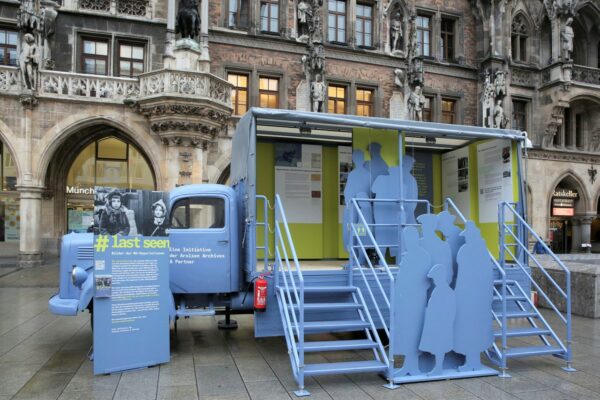
The #LastSeen touring exhibition in Munich
Big issues that move us
Digitization and open data: Digitizing our archive and providing open access to our data are essential to us. We want people everywhere to be able to access the information in our historical documents, now and in the future.
Anti-democratic tendencies and radicalization: Racism, antisemitism and other forms of discrimination and exclusion are threats to social cohesion. We want to stand up for respect, diversity and democracy.
Focus on Europe: As an international organization with German roots, we want to be increasingly active all over Europe with our knowledge and campaigns.
What drives us
Our Vision: Everyone matters.
Our Mission: Based on our unique collection on the victims of Nazi persecution, we honor their legacy by engaging with today‘s society to preserve historical truth and stand up for respect, diversity, and democracy.
Our values
Openness and connection
We are a team which collaborates in an interdisciplinary way to bring about change. We work in a network that is mutually beneficial. We believe in the power of open data and encourage crowdsourcing initiatives.
Commitment and service
We stand up for respect, diversity and democracy, because these values are in danger. We anticipate changes in society and the needs of our target groups, and we respond to them – in Germany, Europe and around the world. We are here to serve society.
Inspiration
We provide stimulating content and ideas, and we encourage people to think for themselves. We are proactive, inspiring and courageous, both internally and towards our partners and society. We especially support the younger generations who will carry society into the future.
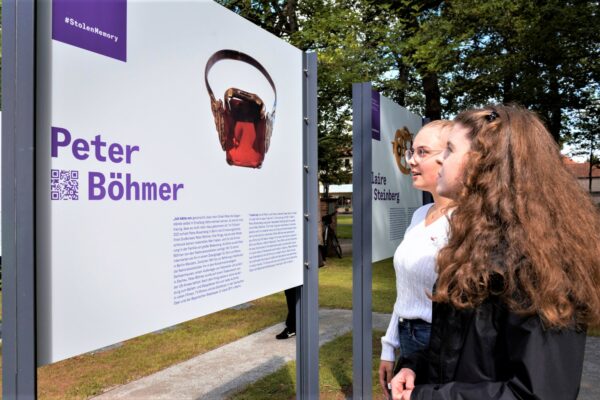
The #StolenMemory exhibition in Bad Arolsen
Student Internships
Are you studying one of the humanities, archival studies, information science, journalism/public relations, or digital humanities? If so, why not complete your compulsory internship at the Arolsen Archives?
Current examination regulations stipulate that compulsory internships (mandatory mid-course internships) are obligatory. Internships are not subject to social security contributions. Unfortunately, the Arolsen Archives cannot pay any remuneration. Two internships are available per semester.
The program is designed differently depending which semester the student is in. We offer the following:
- Basic internships for students in the 2nd to 4th semester: Introduction to all specialist departments
- Internships for students in the 5th semester or higher: Introduction to all specialist departments; the internship is then continued in the department that corresponds to the student’s major field of study
- Internships for special projects as advertised
Duration and requirements
Internships should last for a minimum of 6 weeks and a maximum of 12 weeks.
Interns should be interested in the history of Nazi persecution and its impact on subsequent generations. Open-mindedness, flexibility, a high level of motivation, and a willingness to work both independently and as part of an international team are also important. A good command of English would be advantageous. Additional language skills would be helpful, especially in Polish and Russian.
Application Procedure
- The application deadline for internships during the summer semester (01.04. – 30.09.) is 30.11. of the previous year
- The application deadline for internships during the winter semester (01.10. – 31.03.) is 31.05. of the current year
Please send your complete application to the following address and include proof that the internship is compulsory: hr@arolsen-archives.org
If you have any general questions, please contact: Human Resources, Telefon 05691/629 – 121
ASF Volunteer Service at the Arolsen Archives
The Arolsen Archives are a project partner for the international volunteer service of the Action Reconciliation Service for Peace (ASF), which sends volunteers to one of thirteen project countries for one year.
The ASF volunteers help the Arolsen Archives research individual fates of victims of Nazi persecution in the digitized archive with the aim of giving the people behind the documents a face and keeping their memory alive. Another task is to support Polish- and Russian-language teams with translation work and the processing of inquiries. The volunteers are moreover involved in current projects in the area of research and education, carry out research related to inquiries from scholars, implement commemoration and education initiatives, and accompany visitor groups.
The language prerequisites for volunteer service at the Arolsen Archives are native speaker competence in Polish or Russian and good basic knowledge of German or English. Interest in the history of Nazi tyranny and its impact on the following generations is also important.
More information on ASF volunteer services.
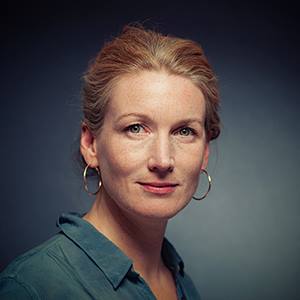
»There is a wide variety of opportunities here, and we have a lot of freedom. I am appreciative of the trust the directorate has in the staff, the professionalism and the good cooperation with my colleagues.«
Sonja Poesel, project manager #everynamecounts
Job-Profile: Sonja Poesel
What is your professional background?
Since completing studies in theatre, film and television as well as design, I have spent 20 years working in the area of conceptual design and project management for agencies and public institutions. My work focuses on exhibitions, campaigns and digital applications. I have also taught project management at Bremen City University of Applied Sciences.
What is your job at the Arolsen Archives?
I am the project manager of the crowdsourcing initiative #everynamecounts: thousands of volunteers are helping us build a digital memorial to the victims of Nazi persecution. Our plans are to make all the documents of the Arolsen Archives available online by 2025. To reach this aim and to attract even more volunteers, I spend most of my time planning high-profile campaigns around #enc and developing new approaches and concepts that I put into practice with an interdisciplinary team.
What fascinates you about the Arolsen Archives?
I am as impressed as ever by the archive itself and by the knowledge contained in the documents themselves and in the minds of the staff. It is an exciting experience for me to witness the transformation process within the Arolsen Archives: from rigid administration to agile project management, from an institution that was closed and reserved to one that is open and cooperative. There is a wide variety of opportunities here, and we have a lot of freedom. I am appreciative of the trust the directorate has in the staff, the professionalism and the good cooperation with my colleagues.
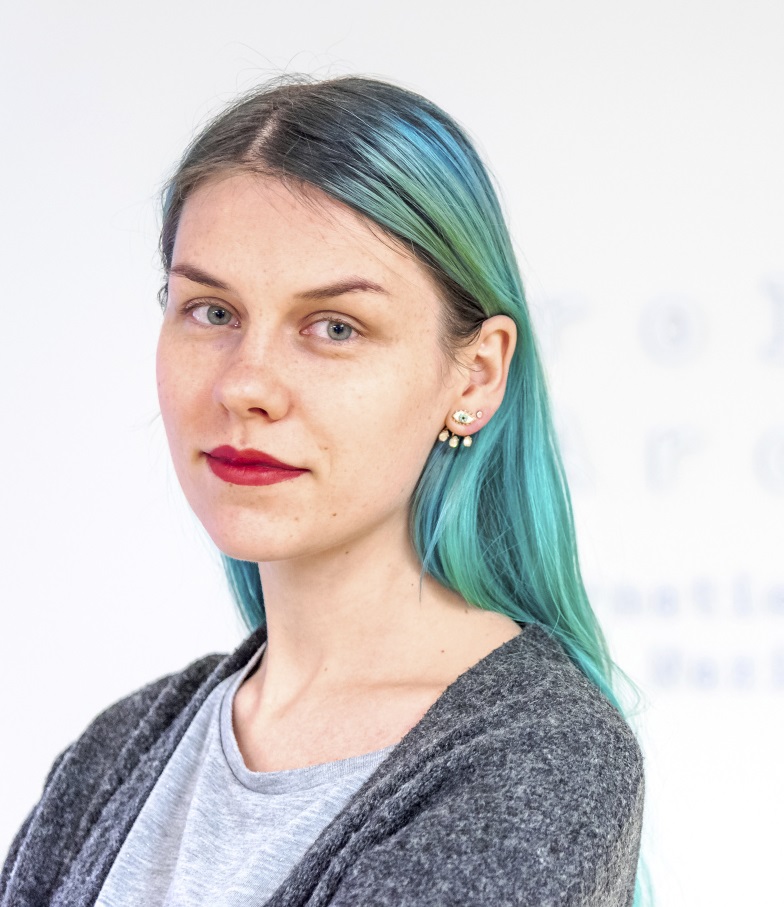
»I am very happy to be able to work here. In my view, the subject of Nazi persecution and our work in the area of remembrance are very important for society. The modern flexible working conditions we have here at the Arolsen Archives are another strong point.«
Hanna Lehun, archivist and research assistant
Job-Profile: Hanna Lehun
What is your professional background?
I studied cultural sciences, photography and history in Kyiv, London and Berlin. A focus of my studies at Humboldt University Berlin was photographs of and letters from Ukrainian forced laborers. I also worked as an exhibition curator and obtained a certificate from Europäisches Kolleg Jena allowing me to curate contemporary history exhibitions.
What is your job at the Arolsen Archives?
I am an archivist and research assistant in the Archival Description Department here. We sort and index the archival material and add new documents on victims of Nazi persecution to the collections. Documents from forced laborers are my field of work – for example postcards that Ukrainian forced laborers sent home from Germany. I also work with Ukrainian archives and institutions on joint events and projects. Together with the #everynamecounts team, I prepare document sub-collections for volunteers to index on the crowdsourcing platform.
What fascinates you about the Arolsen Archives?
I am very happy to be able to work here. In my view, the subject of Nazi persecution and our work in the area of remembrance are very important for society. We offer easy access to unique documents on Nazi crimes, which make it much simpler and much quicker to do research. The modern flexible working conditions we have here at the Arolsen Archives are another strong point. They make it possible to work on complex projects whatever your personal situation may be. I live and work in Berlin, but I have spent time in Ukraine working on specific projects on a number of occasions.

